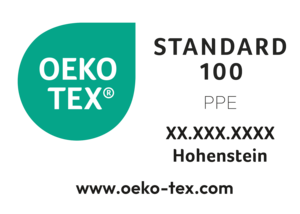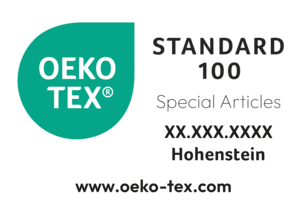Besides the basic certification of textile products, STANDARD 100 offers the possibility to also certify footwear, textiles made from organic cotton or recycled materials, as well as products with specific requirements such as PPE, special articles, etc.
STANDARD 100 certification of organic cotton
If you would like to list articles made of organic cotton with claims such as “organic” or “made of organically grown cotton” on your STANDARD 100 certificate, your products must undergo an additional laboratory test to ensure that they do not contain genetically modified organisms (GMO).
GMO screening builds confidence for your customers and consumers by providing independent proof that your organic cotton products actually contain what they claim - genuine organic quality.
The additional check for genetically modified organisms is possible for materials made from 100% organic cotton as well as for blends of organic cotton with other materials. Blends of organic and conventionally grown cotton, however, are not allowed to be tested for GMO.
If requested, GMO screening within the STANDARD 100 certification is of course also available for your articles that are exclusively made of conventionally grown cotton.
Detailed requirements
- Organic components
All pre-certified main component materials made of cotton must also contain the term “organic” in the scope. Accessories are exempt. - Certificate of origin
A valid organic origin certificate must be submitted with the application for OEKO-TEX® STANDARD 100 certificate. - GMO testing
Negative GMO screening results in addition to the regular testing programme for OEKO-TEX® STANDARD 100.

STANDARD 100 certification of recycled materials
If you would like to indicate on your STANDARD 100 certificate that your products are made of recycled materials, additional requirements will apply for certification. This is because recycled textiles pose different quality assurance and traceability challenges than virgin material due to their previous life.
A hangtag is available to advertise recycled materials in the OEKO-TEX® STANDARD 100 certified product. Certificate owners can download a customised version from the myOEKO-TEX® portal.

Detailed requirements
- At least 20% of the main textile material must be recycled.
- Additional background information about the origin of the materials is required in the application.
- A certificate of origin or validation of any recycled material claim must be submitted by the applicant.
- Since there are no laboratory tests to verify whether a material is recycled or not, the testing programme may differ compared to virgin material. The difference in origin may result in increased testing frequency.
- Recycled material and virgin material cannot be listed together on the same certificate.
- Blends with virgin material are allowed if they are necessary for the production of the material.
STANDARD 100 certification of PPE and Special Articles
The issuing of an OEKO-TEX® STANDARD 100 certificate is also possible for some products that are not covered by a classic STANDARD 100 certification due to their special functional properties or their composition.

Supplement for PPE
The Personal Protective Equipment (PPE) and Materials for PPE supplement to OEKO-TEX® STANDARD 100 covers certification of (finished goods and components of) protective clothing for firefighters, weatherproof clothing or chemical protection clothing, certain military garments and uniforms comparable to PPE, etc. The exceptions for PPE and PPE materials (e.g. NMP, Pigment Violet 23 and PFOA) relate to the specific requirements of this market segment.

Supplement for Special Articles
The Special Articles supplement for OEKO-TEX® STANDARD 100 covers certification of complex products with differing requirements based on construction, technology or conditions of use. It applies only to finished goods/end products, including strollers, suitcases, backpacks, orthopaedic devices, sunshades, tents, curtain kits, beds, some toys, cleaning devices, chairs, couches, etc.
STANDARD 100 certification of footwear
In addition to textiles, we also test footwear (as finished sales articles) and individual components for the production of footwear for you according to OEKO-TEX® STANDARD 100 for harmful substances. As a brand, retailer or supplier, you benefit from STANDARD 100 certification in two ways:
- Low market risk due to compliance with legal requirements
A STANDARD 100 certificate is only awarded if all components comply with the requirements of STANDARD 100 RSL. In the case of footwear, this is particularly important because it consists of many different individual components that represent potential sources of input for harmful substances. - Transparency, traceability and shared costs
STANDARD 100 is a modular system that recognizes already certified source materials and components at subsequent stages of production without the need for renewed laboratory testing. This spreads the cost of certification among the companies involved. When using STANDARD 100 certified components, you can transparently trace their origin and at the same time be sure that your shoes meet all market requirements even before you assemble your products.
STANDARD 100 certification according to Annex 6/7
Usually, product certification according to OEKO-TEX® STANDARD 100 is carried out in accordance with the test criteria and limit values listed in Annex 4/5 of the standard, which are updated once a year. Especially for companies that have committed themselves to the goals of the Greenpeace Detox campaign, OEKO-TEX® offers an extended criteria catalogue, the requirements of which are summarised in Annex 6/7.
Annex 6/7 prescribes stricter limit values for many test parameters and substances that must be complied with in the STANDARD 100 laboratory tests. However, these stricter limit values do not apply for human ecological reasons, but aim to achieve improved environmental performance in the production of textiles in the sense of the Detox campaign.
Use of active chemcial products (ACP) in STANDARD 100 certification
OEKO-TEX® STANDARD 100 generally exludes use of active chemical products (ACPs) such as biologically active or flame retardant finishes for certified products. However, with some textiles such as Personal Protective Equipment, the use of ACPs is unavoidable. In this case, ACPs may be used, provided that they are assessed by independent toxicologists as being harmless to human health. Another prerequisite is that the ACPs are strictly used as intended and that they comply with current European legislation.
If new scientific findings come to light which question the safety of a substance with regard to health, OEKO-TEX® reserves the right to remove the ACP in question from its list of accepted products.
